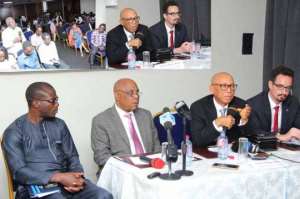
Panellists at a roundtable on Media and Corruption in Ghana have called for the establishment of a Media Fund to support investigative journalism.
According to them, such a fund would support investigations that reflect the media's watchdog role and assist the public in holding those in power accountable.
The Fund, by this objective, would go a long way to contribute to the sustainability of democracy and the rule of law in Ghana.
The panellists include Mr Zakaria Tanko Musah, a Legal Practitioner, and Lecturer at the Ghana Institute of Journalism, Madam Beauty Narteh, Executive Director, Ghana Anti-Corruption Coalition, Mr Manasseh Azure Awuni, Senior Journalist, Joy News, and Mr William Nyarko, the Executive Director, African Centre for International Law and Accountability.
On the issue of paying transport allowances to journalists by organisers of events, the panellists were of the view that it should be discouraged and that media houses must do their best to provide means of transport for their staff, who cover events.
They also urged journalists to apply the Ghana Journalists Association's (GJA) Code of Ethics in their line of duties.
They suggested that regular training programmes structured for various categories of journalists would help promote ethical standards and professionalism.
Mr Musah urged journalism training institutions to inculcate in their students the ethics of the journalism profession so as to adequately prepare them for industry.
He said one tragedy on the media landscape was the unwillingness of journalists to take up investigative reporting.
Madam Narteh said there was the need for a holistic approach to fighting corruption in Ghana.
Mr Awuni noted that there was corruption in the media in Ghana, citing instances where there were attempts by some 'senior journalists' to prevent him from going ahead with the publication of some of his investigative reports.
Mr Nyarko, on his part, said the media reflected society, and as far as there was corruption in society, there would also be corruption in the media.
He said the media in Ghana had done well over the years, even though there was no Right to Information Bill.
Mr Nyarko urged editors and owners of media houses to take the issue of investigative reporting seriously and commended the Daily Graphic and Joy FM for their laudable roles in investigative journalism.
The seminar, which was organised by the Media Foundation for West Africa (MFWA), attracted high profile personalities such as Mr Justice Emile Short, a former Commissioner of the Commission on Human Rights and Administrative Justice (CHRAJ), who chaired the function; Mr Tirso Dos Santos, Head of Office and Representative of UNESCO Ghana; and Mr Daniel Blank, Country Representative Ghana, DW Akademie.
Mr Short, in his remarks, urged the CHRAJ to organise training workshops for journalists on corruption and what constituted corruption.
He said the payment of transport allowances to journalists during coverage of functions must be given a second look by stakeholders.
Mr Dos Santos lauded the panel members for their brilliant presentations, especially the call for the establishment of the Media Fund for investigative journalism.
He said media houses and journalists who excelled in their line of duties would be given the needed support to keep them going.
Mr Blank said financial sustainability of media houses was critical to enable them to deliver on their mandate.
Mr Sulemana Braimah, the Executive Director of MFWA, who moderated the panel discussion, in an interview with the Ghana News Agency, said the seminar was to find out if there was corruption in the media, and if there was, what were the driving factors.
He said the seminar also sought to identify ways to get the media to become more impactful in championing the fight against corruption in the country.




 Dumsor must stop vigil part 2: We’ll choose how we demonstrate and who to partne...
Dumsor must stop vigil part 2: We’ll choose how we demonstrate and who to partne...
 2024 elections: NDC stands on the side of morality, truth; NPP isn't an option —...
2024 elections: NDC stands on the side of morality, truth; NPP isn't an option —...
 Akufo-Addo has moved Ghana from 'Beyond Aid' to ‘Beyond Borrowing’ — Haruna Idri...
Akufo-Addo has moved Ghana from 'Beyond Aid' to ‘Beyond Borrowing’ — Haruna Idri...
 Train crash: NDC is full of evil mindset; driver who 'deliberately' parked the c...
Train crash: NDC is full of evil mindset; driver who 'deliberately' parked the c...
 Dumsor: Energy Minister must be fired; it’s becoming unbearable — IES
Dumsor: Energy Minister must be fired; it’s becoming unbearable — IES
 #DUMSORMUSTSTOP: IMANI responds to Yvonne Nelson's call for a joint vigil
#DUMSORMUSTSTOP: IMANI responds to Yvonne Nelson's call for a joint vigil
 'Obiara b3didi' — Manhyia South NPP Chairman fights for resourcing of NPP grassr...
'Obiara b3didi' — Manhyia South NPP Chairman fights for resourcing of NPP grassr...
 Dumsor: This thing is becoming unbecoming, collapsing our business — Nana Ofori ...
Dumsor: This thing is becoming unbecoming, collapsing our business — Nana Ofori ...
 Dumsor: It'll be no more by the end of April — Gideon Boako assure Ghanaians
Dumsor: It'll be no more by the end of April — Gideon Boako assure Ghanaians
 "I can now see clearly with my two eyes, thanks to the generosity of Afenyo-Mark...
"I can now see clearly with my two eyes, thanks to the generosity of Afenyo-Mark...
